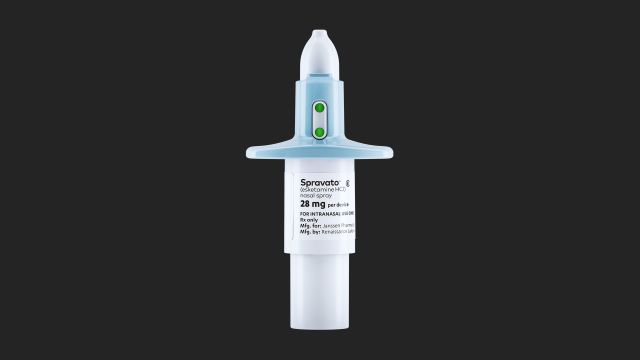People with severe, treatment-resistant depression have a long-awaited, new treatment option.
The U.S. Food and Drug Administration (FDA) approved the drug, esketamine (brand name, Spravato), for those struggling with major depressive disorder who have not responded to at least two other oral antidepressants. The newly-approved nasal spray is to be used along with other medications that are taken by mouth—not replace them.
It’s arguably been roughly 30 years since any truly new treatment options have become available. Prozac and other related drugs first became available in the late 1980s, but the antidepressants that have been given the green light since then have largely been variations of existing drugs.
What is esketamine?
Esketamine is a variant of ketamine, a short-acting anesthetic with hallucinogenic effects. Esketamine is thought to work by targeting a chemical in the brain called glutamate, which helps transmit signals between brain cells. For people with major depressive disorder, the drug may help ease their symptoms by boosting or reestablishing brain connections. Unlike other antidepressants that can take weeks or months to take effect, the new nasal spray is fast-acting and can begin to relieve symptoms of depression within hours to a couple of days.
The approval of esketamine, which was developed by Janssen Pharmaceuticals, a branch of Johnson & Johnson, is welcome news for the estimated one-third of U.S. adults with major depression disorder that have not responded to other treatments.
“There has been a long-standing need for additional effective treatments for treatment-resistant depression, a serious and life-threatening condition,” said Tiffany Farchione, MD, acting director of the Division of Psychiatry Products in the FDA’s Center for Drug Evaluation and Research in an FDA news release.
While esketamine may be an option for some people, it’s not a perfect fit for everyone. Here’s what you should know.
Weighing the possible risks and benefits
Ketamine has long been used as an anesthetic, known for its dissociative and hallucinogenic effects. In February 2019 however, an FDA advisory committee convened to assess the safety and effectiveness of the variation esketamine for those with depression.
After examining the results of four clinical trials, the FDA committee concluded that esketamine’s possible benefits outweigh its risks. The committee members recommended that the agency approve the drug, noting that Janssen Pharmaceuticals provided enough evidence to prove esketamine is effective in managing treatment resistant depression and that the drug’s safety report is satisfactory. The FDA’s decision to approve esketamine is based on these recommendations.
Not everyone is eligible for treatment
Esketamine is only available to those with major depressive order who’ve not responded to at least two other oral antidepressant drugs. Even within this group of people, there are some who should not use the drug, including those with:
- aneurysmal vascular disease and poorly controlled hypertension
- arteriovenous malformation
- intracerebral hemorrhage
- sensitivity to drugs like esketamine or ketamine
Taking esketamine can raise blood pressure—which can be risky if you have heart or circulatory issues.
And tell your doctor if you have one of the following conditions, as treatment may not be recommended:
- slow or fast heartbeats
- history of heart attack or stroke
- heart failure
- history of brain injury
- liver problems
- psychosis
Pregnant women should not take esketamine since the drug is harmful to a developing fetus. If you’re planning to become pregnant or you’re breastfeeding, it’s best to refrain from seeking this kind of treatment.
There are side effects
Like all drugs, there are some possible side effects. In clinical trials, the most common side effects of esketamine included an out-of-body experience, dizziness, nausea, sedation, spinning sensation, a lack of sensation, anxiety, lethargy, increased blood pressure and feeling intoxicated.
There are also some risks involved with the treatment, including the possibility that the drug could be misused or abused. There’s also an increased risk of suicidal thoughts or actions, especially during the first few months of treatment. For these reasons, esketamine must be administered by a healthcare provider following strict requirements. A doctor must monitor patients for side effects for at least two hours after they’ve used the nasal spray. If you do experience adverse effects, tell your healthcare provider.
Other side effects may include impaired alertness and coordination, so don’t drive or operating machinery until the day after treatment.
Possible treatment barriers
The costs of esketamine and time commitment involved in receiving this treatment may be a logistical challenge for some patients.
Esketamine must be taken along with other oral antidepressant as directed by your doctor, and you can expect to have two treatments per week, particularly in the beginning. You should also not eat for at least two hours before taking esketamine and not drink for at least 30 minutes before using the medication.
Johnson & Johnson says the price tag for this nasal spray will range between $4,720 to $6,785 for the first month (not including doctor’s fees), noting that costs will drop over time.
If you have treatment-resistant depression, talk to your doctor to learn if this treatment option might be right for you.
Image credit: Janssen Pharmaceutical Companies of Johnson & Johnson.






